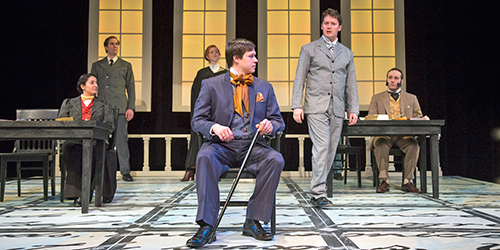By Carolyn Hayes

In 1895, celebrated scribe and legendary wit Oscar Wilde sued a man for libel and lost; the private details unearthed in that trial, in turn, led to Wilde's own arrest, trial and eventual conviction for engaging in homosexuality. This blanket description alone swells with scandalous dramatic possibility, but the reality was even more intricate, interrogating the complex interplay of an artist's self, his work and his philosophy, and then throwing in the added complications of societal morality and celebrity to the mix.
Playwright Moises Kaufman fastidiously reconstructs the events into his own artistic conception, "Gross Indecency: The Three Trials of Oscar Wilde," now at the Hilberry Theatre under the direction of Blair Anderson. While the production shows a smooth execution of an unusual narrative form, it has less success in identifying its opus, incongruously asking to be appreciated on solely artistic grounds while simultaneously making faulty passes at emotional appeal and didactic purpose.
The play is told entirely via primary and secondary sources, drawing heavily from trial transcripts, but also incorporating quotes from newspapers, biographies and the writings of Wilde (Topher Allen Payne) and his longtime lover, Lord Alfred Douglas (David Sterritt). These different, opinionated voices flesh out the dubiously motivated libel suit brought against Lord Alfred's disapproving father (Brent Griffith), who thought that by heaping scandal upon Wilde, he could ruin the elder man and consequently recover his rebellious younger son. Through this and the subsequent trials prosecuting the artist, the courtroom thrummed with scandalous details, Wilde's beliefs and works were attacked as vehemently as his character, and media and public sentiment fell to breathless puritanical judgment. In the eyes of clamped-down Victorian society, homosexuality was not merely an offense punishable by imprisonment and hard labor, but the worst, most immoral crime imaginable.
Every scrap of text is clearly the result of exhaustive research (for which the author's dramaturg, Stephen Wangh, deserves mention); this is made clear by ongoing citations and explanatory footnotes, delivered by a supporting cast that collaborates to serve a shared narrative function. The device also allows actors to visibly don and shed their different parts, an artifice that cleanly justifies women inhabiting men's roles (mindfully costumed by Mary Gietzen).
The unconventional storytelling of the full-bibliography conceit has surprising advantages, chief among them the disconnect between a character's own recollections and accounts by others. In particular, Annie Keris soars with contradiction within the character of Wilde's serious, competent, but dismayed lawyer. The authenticity of using transcripts brings Wilde's scathing intelligence and maddening particularities to life, making literary treats of the delightful semantic battles between Payne and Alec Barbour as a defending barrister.
The narrative format also permits the playwright to skip ahead or note an unspoken "et cetera," best exemplified in a well-timed parade of miscreants that serves as a comic showcase for Bevin Bell-Hall, Miles Boucher, Brandon Grantz, and Brandy Joe Plambeck.
Scenic designer Sarah Pearline answers the representative and deliberately unreal proceedings with a perspective-bending funhouse of a courtroom set, its white raked floor and railings in glaring contrast to the black details and furniture. Symbolic though it may be, the setting may be too specific, as scenes set in flashback or in tandem feel strangely confined or out of place. (A contributing factor may be Michael "Mick" Keathley II's lighting design, which glosses over many of the constant narrative shifts, underlining only the most capital-I Important themes with harsh backlighting and a weak spotlight.) Sound design by Leah McCall fills in audience reactions in keeping with the transcripts, canned noises that further divide the unusual onstage proceedings from the genuine reactions of the play's live audience.
With these tactics, the play is mirroring Wilde's own deeply founded Hellenistic perspective of art for art's sake. It unfolds here in a clear execution of a very good, albeit complex, script, although the whole of the show falls somewhat short of being revelatory.
Some of this can be attributed to Payne's portrayal of Wilde, who animatedly praises literary and aesthetic beauty above all else, but is reticent to show interest in the proceedings that will dictate his fate, leading to long stretches of reasoning met by furtive indifference.
Additionally, Kaufman self-sabotages his artistic ideal by padding an already-lengthy show with an intriguing but pointed contextual interlude and a heavy-handed, melodramatic coda.
With its upfront emphasis on source material and its thorough coverage, "Gross Indecency" holds plenty of intrigue for history buffs. Viewers familiar with Wilde's literary achievements should also appreciate the in-depth look at the collision of his personal and artistic lives; similarly, fans of alternative dramatic structures will find much to mine from this play. Still, although the production itself has a competent grasp on its form and flow, it ultimately gets tangled up in the script's uncertainty as to whether the story is self-sufficient, or should serve a greater purpose.
REVIEW:
'Gross Indecency: The Three Trials of Oscar Wilde'
Hilberry Theatre, 4743 Cass Ave., Detroit. 8 p.m. Jan. 11, 16-18, 30-31, Feb. 1, March 20-22, and 2 p.m. Jan. 15 and Feb.1. $12-30. 313-577-2972. http://www.hilberry.com









